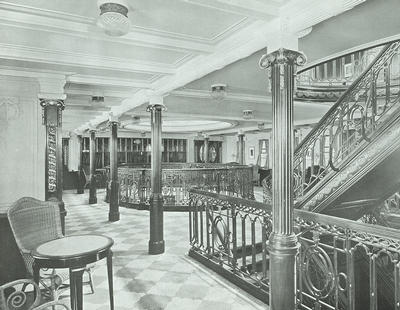
Walter Macfarlane & Co supplied ornamental cast iron railings for stairs and light wells in SS Balmoral Castle, as shown in this photograph c 1910.
Shipyards on the Clyde placed contracts with a wide range of firms in the city and beyond. The yards suffered periodic bouts of recession, however, and Macfarlane's was more fortunate than some suppliers in not being totally dependent on the custom of shipbuilders.
Balmoral Castle was built for the Union-Castle Line in 1910 by the Fairfield Ship Building & Engineering Co at Govan. She had a tonnage of 13361 grt, a length of 570 feet, a beam of 64 feet 6 inches and a service speed of 14 knots. She was the first company ship to be equipped with Marconi wireless telegraphy and when she made her maiden mail voyage to South Africa in February 1910 she completed the run in 16.5 days. She served as a troopship in the First World War, and was scrapped in 1939.
Reference: Mitchell Library, GC f672.2506541443 MCF
Reproduced with the permission of Glasgow City Council, Libraries Information and Learning
Keywords:
Balmoral Castle, cast iron, Fairfield Shipbuilding & Engineering Co, First World War, foundries, iron founders, light wells, Marconi wireless telegraphy, ornamental ironwork, Saracen Foundry, shipbuilding, stairs, steamships, troopships, Union-Castle Line, Walter Macfarlane & Co
You have 0 images in your photo album.